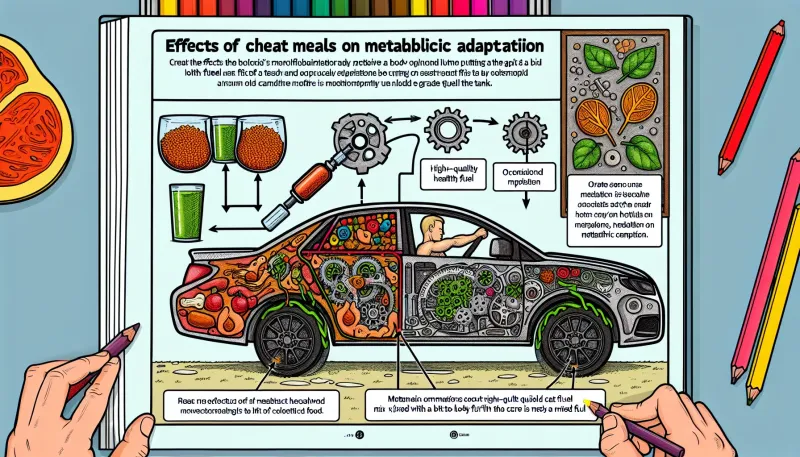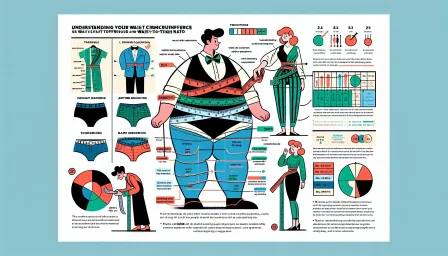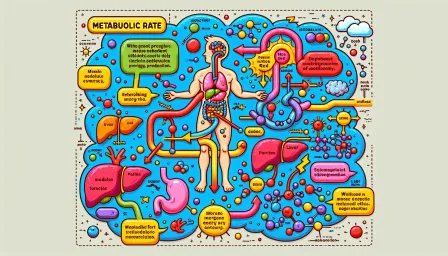How Cheat Meals Influence Metabolic Adaptation: The Science Explained

Discover how cheat meals influence metabolic adaptation. Understand the science behind it and how it can impact your fitness goals.
Introduction
Cheat meals have long been a topic of interest in the health and fitness community. Many believe that incorporating cheat meals into a diet plan can aid in maintaining metabolic rates and enhancing psychological well-being. But what does science say about the relationship between cheat meals and metabolic adaptation? This article delves into the scientific evidence to provide a comprehensive understanding of this intriguing topic.
What Are Cheat Meals?
Before we dive into the science behind cheat meals and metabolic adaptation, it's important to define what cheat meals are. A cheat meal is a planned indulgence in eating, where an individual allows themselves to consume foods that are typically restricted during their diet plan. The idea is to enjoy these foods without feeling guilty, aiding in adherence to a more restrictive diet in the long term.
Understanding Metabolic Adaptation
What is Metabolic Adaptation?
Metabolic adaptation, also known as adaptive thermogenesis, is the change in metabolic rate in response to factors like calorie intake and physical activity. When you restrict calories for an extended period, your body tends to lower its metabolic rate to conserve energy. This can make weight loss more challenging over time.
The Body's Response to Dieting
When you follow a calorie-restricted diet, your body perceives it as a period of famine and activates survival mechanisms. Reduced thyroid hormone levels, decreased sympathetic nervous system activity, and reduced thermogenesis are some changes observed during prolonged caloric deficit. This is your body's way of conserving energy, which can hinder your weight loss efforts.
How Cheat Meals Influence Metabolic Adaptation
The Role of Hormones
One of the key ways cheat meals might influence metabolic adaptation is through hormonal regulation. Leptin, a hormone produced by fat cells, plays a critical role in regulating energy balance by inhibiting hunger. During prolonged caloric restriction, leptin levels drop, signaling the body to conserve energy. Cheat meals, which provide a temporary increase in calorie intake, can help restore leptin levels, signaling the body that it is not in a state of prolonged famine.
Psychological Benefits
From a psychological perspective, cheat meals can provide a sense of relief and satisfaction, reducing cravings and increasing adherence to a diet plan. The enjoyment derived from planned indulgence can help mitigate the mental fatigue associated with strict dieting. This can be a crucial factor in sustaining long-term dietary adherence, which is essential for achieving fitness goals.
Boosting Metabolism Temporarily
There is some evidence suggesting that cheat meals can lead to a temporary increase in metabolic rate. The influx of calories might cause a transient boost in thermogenesis (the production of heat), which can temporarily elevate metabolic rate. However, it is crucial to note that this effect is usually short-lived and should not be relied upon solely for weight management.
Scientific Studies on Cheat Meals and Metabolic Adaptation
Researchers have studied the effects of cheat meals on metabolic adaptation with mixed results. Some studies suggest that periodic refeeding can help offset some of the negative effects of prolonged calorie restriction. For example, a study published in the journal Obesity found that participants who followed a diet including periodic refeeding days experienced less metabolic slowdown compared to those who followed continuous calorie restriction.
However, more research is needed to fully understand the long-term implications of incorporating cheat meals into a diet plan. Current evidence suggests that while cheat meals can have benefits, they are not a magic solution and should be used strategically.
How to Incorporate Cheat Meals for Optimal Results
Balance and Moderation
To maximize the benefits of cheat meals while minimizing potential drawbacks, it is essential to practice balance and moderation. A cheat meal should not turn into a cheat day or an excuse to binge. It’s important to enjoy your indulgence without derailing your overall dietary goals.
Timing and Frequency
The timing and frequency of cheat meals can vary based on individual goals and metabolism. For some, a weekly cheat meal might be sufficient, while others might benefit from less frequent indulgences. Listening to your body and adjusting based on your progress can be key to finding the right balance.
Quality of Cheat Meals
The quality of foods selected for cheat meals can also play a role. Opting for nutrient-dense foods, even when indulging, can provide more benefits compared to highly processed junk foods. For instance, choosing a homemade pizza with whole ingredients over a fast-food option can make a positive difference.
Potential Drawbacks of Cheat Meals
While cheat meals can offer several benefits, there are potential drawbacks to consider. For some individuals, cheat meals might trigger overeating or binge eating behaviors, which can counteract the benefits. Additionally, relying too heavily on cheat meals can lead to a cycle of restriction and indulgence, which might not support long-term health and fitness goals.
Conclusion
Cheat meals and metabolic adaptation are complex, interrelated phenomena that require a nuanced approach. While cheat meals can offer both psychological and physiological benefits, they should be used strategically for optimal results. Balancing enjoyment with moderation and considering the quality of cheat foods can help maximize the positive effects while minimizing potential drawbacks.
Overall, more research is needed to fully understand the long-term implications of cheat meals on metabolic adaptation. However, when incorporated thoughtfully, cheat meals can be a valuable tool in a sustainable and enjoyable diet plan that supports long-term fitness goals.



























